ATHENE MYTHS 1
Greek Name
Αθηνη
Transliteration
Athênê
Latin Spelling
Athena
Translation
Minerva
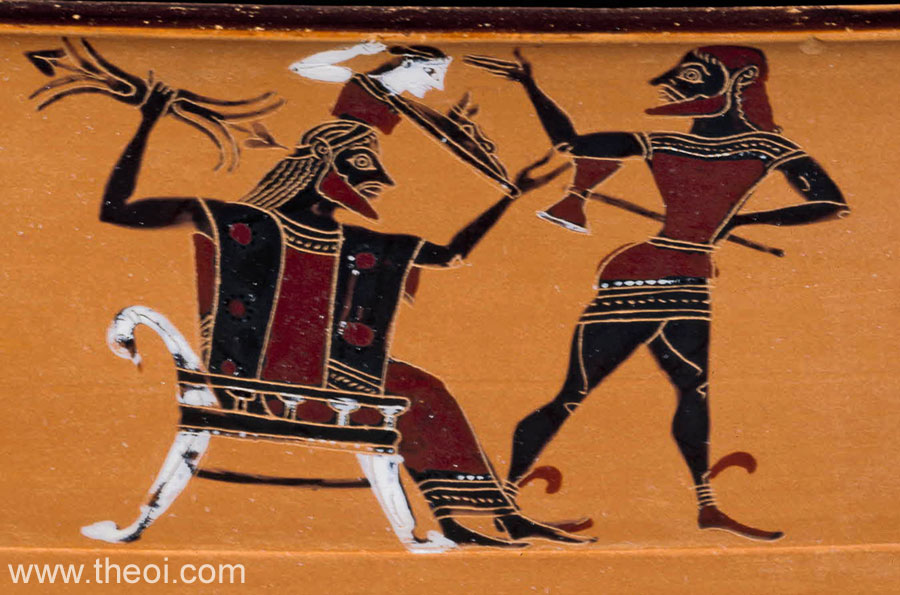
ATHENA was the Olympian goddess of wisdom, war, heroism and crafts.
This page contains tales of the goddess from the sagas of the gods including her birth, death of Pallas, War of the Giants, creation of Pandora, contest with Poseidon for Athens, birth of Erikhthonios (Erichthonius), and flute of Marsyas.
CLASSICAL LITERATURE QUOTES
THE BIRTH OF ATHENA
I. DAUGHTER OF ZEUS
Hesiod, Theogony 886 ff (trans. Evelyn-White) (Greek epic C8th or 7th B.C.)
:
"Now Zeus, king of the gods, made Metis (Wise Counsel) his wife first, and she was wisest among gods and
mortal men. But when she was about to bring forth the goddess bright-eyed Athene, Zeus craftily deceived her
with cunning words and put her in his own belly, as Gaia (Earth) and starry Ouranos (Heaven) advised. For they
advised him so, to the end that no other should hold royal sway over the eternal gods in place of Zeus; for very
wise children were destined to be born of her, first the maiden bright-eyed Tritogeneia, equal to her father in
strength and in wise understanding; but afterwards she was to bear a son of overbearing spirit, king of gods and
men. But Zeus put her into his own belly first, that the goddess might devise for him both good and evil."
Hesiod, Theogony 929a ff :
"Zeus lay with the fair-cheeked daughter of Okeanos and Tethys apart from Hera ((lacuna)) . . deceiving
Metis (Thought) although she was full wise. But he seized her with his hands and put her in his belly, for fear
that she might bring forth something stronger than his thunderbolt: therefore did Zeus, who sits on high and
dwells in the aether, swallow her down suddenly. But she straightway conceived Pallas Athene: and the father of
men and gods gave her birth by way of his head on the banks of the river Trito. And she remained hidden beneath
the inward parts of Zeus, even Metis, Athena's mother, worker of righteousness, who was wiser than gods and
mortal men. There the goddess (Athena) received that [her arms] whereby she excelled in strength all the
deathless ones who dwell in Olympos, she who made the host-scaring weapon of Athena. And with it [Zeus) gave her
birth, arrayed in arms of war."
Hesiod, Theogony 924 ff :
"But Zeus himself [shortly after his marriage to Hera] gave birth from his own head to [Athena] bright-eyed
Tritogeneia (the thrice born), Deino (the awful), the strife-stirring, Agestratos (the host-leader), Atrytone
(the unwearying), Potnia Egrekydoimos (the queen, who delights in tumults and wars and battles).
But Hera without union with Zeus--for she was very angry and quarrelled with her mate--bare famous Hephaistos,
who is skilled in crafts more than all the Ouraniones (Heavenly Ones)."
Pindar, Olympian Ode 7. 33 ff (trans. Conway) (Greek lyric C5th B.C.) :
"The land circled by the sea [Rhodes], where once the great king of the gods [Zeus] showered upon the city
snowflakes of gold; in the day when the skilled hand of Hephaistos wrought with his craft the axe,
bronze-bladed, whence from the cleft summit of her father's brow Athene sprang aloft, and pealed the broad sky
her clarion cry of war. And Ouranos (Heaven) trembled to hear, and Mother Gaia (Earth).
Then was it too the great god Hyperionides [Helios the sun], giver of light to mortal men, this task to his
beloved sons [i.e. the Heliadai of Rhodes] enjoined to ensure well hereafter: that they first to the goddess
built a shining altar, and founding holy rites of sacrifice, make glad the heart of Zeus, and the maid of the
sounding spear. Now Reverence, the daughter of Forethought, gives to men virtue and valour's joy.
And yet comes too, on stealthy wing, that cloud of forgetfulness, drawing our baffled minds off from the
straight road of their acts' intent. For they mounted aloft, but carried in their hands no seed of burning
flame, but on the city's height [i.e. the acropolis of Lindos] founded a precinct without holy fire. Yet for
these men Zeus brought the saffron cloud, and rained flood of gold, and the grey-eyed goddess herself endowed
them the gift of skill, that of all men on earth, their hands in craft excelling have the mastery. And the roads
carried their worked images of life and movement, and widespread was their renown."
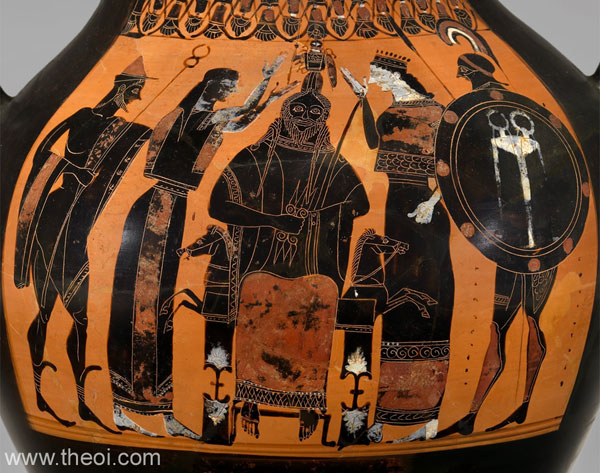
Pseudo-Apollodorus, Bibliotheca 1. 20 (trans. Aldrich) (Greek mythographer C2nd A.D.)
:
"Zeus slept with Metis, although she turned herself into many forms in order to avoid having sex with him.
When she was pregnant, Zeus took the precaution of swallowing her, because she had said that, after giving birth
to the daughter presently in her womb, she would bear a son who would gain the lordship of the sky. In fear of
this he swallowed her. When it came time for the birth, Prometheus (or Hephaistos, according to some) by the
river Triton struck the head of Zeus with an axe, and from his crown Athena sprang up, clad in her armour."
Strabo, Geography 14. 2. 10 (trans. Jones) (Greek geographer C1st B.C. to C1st A.D.)
:
"The poet [Homer], too, seems to bear witness to the prosperity enjoyed by the Rhodians from ancient times,
forthwith from the first founding of the three cities : ‘and there his people settled in three divisions
by tribes, and were loved of Zeus, who is lord over gods and men; and upon them, wondrous wealth was shed by the
son of Kronos.’ Other writers refer these verses to a myth, and say that gold rained on the island at the
time when Athena was born from the head of Zeus, as Pindar states."
Strabo, Geography 9. 2. 36 :
"Now as for Alalkomenai [a town in Boiotia], the poet [Homeros] mentions it, but not in the Catalogue
: ‘Hera Argeia (of Argos) and Athena Alalkomeneis.’ It has an ancient temple of Athena which
is held in great honor; and they say, at least, that the goddess was born there, just as Hera was born in Argos,
and that it was because of this that the poet named them both in this way, as natives of these places."
Pausanias, Description of Greece 1. 24. 5 (trans. Jones) (Greek travelogue C2nd A.D.)
:
"As you enter the temple [of Athena on the Akropolis at Athens] that they name the Parthenon, all the
sculptures you see on what is called the pediment refer to the birth of Athena."
Pausanias, Description of Greece 3. 17. 3 :
"[Amongst the bronze reliefs decorating the temple of Athena on the acropolis of Sparta:] There are also
wrought the birth of Athena, Amphitrite, and Poseidon, the largest figures, and those which I thought the best
worth seeing."
Philostratus the Elder, Imagines 2. 27 (trans. Fairbanks) (Greek rhetorician C3rd
A.D.) :
"[Ostensibly a description of an ancient Greek painting at Neapolis (Naples) :] The Birth of Athena. These,
wonder-struck beings are gods and goddesses, for the decree has gone forth that not even the Nymphai may leave
the heavens, but that they, as well as the Potamoi (Rivers) from which they are sprung, must be at hand; and
they shudder at the sight of Athena, who at this moment has just burst forth fully armed from the head of Zeus,
through the devices of Hephaistos, as the axe tells us. As for the material of her panoply, no one could guess
it; for as many as are the colours of the rainbow, which changes its light now to one hue and now another, so
many are the colours of her armour. Hephaistos seems at a loss to know by what gift he may gain the favour of
the goddess; for his lure is spent in advance because her armour was born with her. Zeus breathes deeply with
delight, like men who have undergone a great contest for a great prize, and he looks searchingly for his
daughter, feeling pride in his offspring; nor yet is there even on Hera's face any trace of indignation; nay,
she rejoices, as though Athena were her daughter also.
Two peoples are already sacrificing to Athena on the acropolis of two cities, the Athenians and the Rhodians,
one on the land and one on the sea, [sea-born] and earth-born men; the former offer fireless sacrifices that are
incomplete, but the people of Athens offer fire, as you see yonder, and the savour of burnt flesh. The smoke is
represented as fragrant and as rising with the savour of the offerings. Accordingly the goddess has come to the
Athenians as to men of superior wisdom who make excellent sacrifices. For the Rhodians, however, as we are told,
gold flowed down from heaven and filled their houses and their narrow streets, when Zeus caused a cloud to break
over them, because they also gave heed to Athena. The divinity Ploutos (Wealth) also stands on their acropolis,
and he is represented as a winged being who has descended from the clouds, and as golden because of the
substance in which he has been made manifest."
Philostratus, Life of Apollonius of Tyana 6. 19 (trans. Conybeare) (Greek biography
C1st to 2nd A.D.) :
"If you would fashion an image of Athene, as Pheidias in his day endeavoured to do, you must image in your
mind armies and cunning, and handicrafts, and how she leapt out of Zeus himself."
For MORE information on the mother of Athena see METIS
II. DAUGHTER OF POSEIDON
Pausanias, Description of Greece 1. 14. 6 (trans. Jones) (Greek travelogue C2nd A.D.)
:
"When I saw that the statue of Athena [beside the Erekhtheion temple in Athens] had blue eyes I found out
that the legend about them is Libyan. For the Libyans have a saying that the Goddess is the daughter of Poseidon
and Lake Tritonis, and for this reason has blue eyes like Poseidon."
Suidas s.v. Hippeia Athene (trans. Suda On Line) (Byzantine Greek lexicon C10th A.D.)
:
"Hippeia Athene (Athena-of-Horses) : They say she is a daughter of Poseidon and Polyphe, daughter of
Okeanos; she was the first to use a chariot and was called ‘of-Horses’ because of this."
THE CHILDHOOD OF ATHENA & HER FRIEND PALLAS
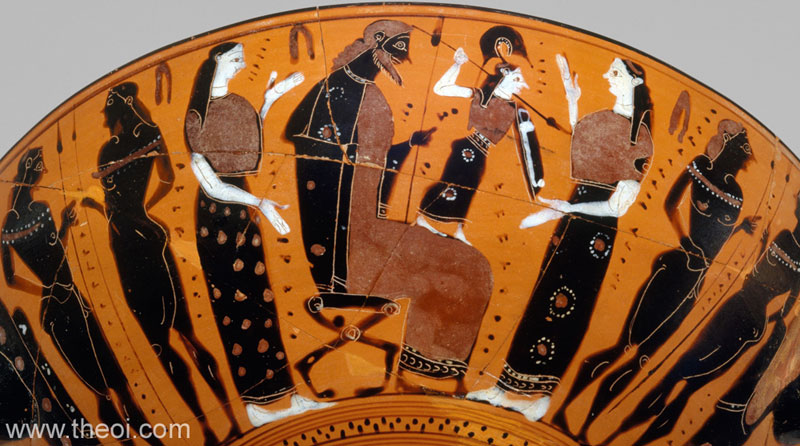
Pseudo-Apollodorus, Bibliotheca 3. 144 (trans. Aldrich) (Greek mythographer C2nd
A.D.) :
"They say that after Athene's birth, she was reared by Triton, who had a daughter named Pallas. Both girls
cultivated the military life, which once led them into contentious dispute. As Pallas was about to give Athene a
whack, Zeus skittishly held out the aegis, so that she glanced up to protect herself, and thus was wounded by
Athene and fell. Extremely saddened by what had happened to Pallas, Athene fashioned a wooden likeness of her,
and round its breast tied the aegis which had frightened her, and set the statue beside Zeus and paid it honour.
Later on, Elektra, after her seduction, sought refuge at this statue, whereupon Zeus threw both her and the
palladium into the Ilian land."
Pausanias, Description of Greece 9. 33. 5 (trans. Jones) (Greek travelogue C2nd A.D.)
:
"Alalkomenai [in Boiotia] is a small village, and it lies at the very foot of a mountain of no great
height. Its name, some say, is derived from Alalkomeneos, an aboriginal, by whom Athena was brought up . . .
Here too [in Alalkomenai] there flows a river, a small torrent. They call it Triton, because the story is that
beside a river Triton Athena was reared, the implication being that the Triton was this and not the river in
Libya, which flows into the Libyan sea out of lake Tritonis."
For MORE information on the childhood friend of Athena see PALLAS
For the MYTH of the Palladium of Troy see Athena & the Trojan War:
Theft of the Palladium
THE VIRGINITY OF ATHENA
Homeric Hymn 5 to Aphrodite 7 ff (trans. Evelyn-White) (Greek epic C7th to 4th B.C.)
:
"Golden Aphrodite Kypria, who stirs up sweet passion [i.e. sexual desire] in the gods and subdues the
tribes of mortal men . . . Yet there are three hearts that she cannot bend nor yet ensnare. First is the
daughter of Zeus who holds the aigis, bright-eyed Athene; for she has no pleasure in the deeds of golden
Aphrodite, but delights in wars and in the work of Ares, in strifes and battles and in preparing famous crafts.
She first taught earthly craftsmen to make chariots of war and cars variously wrought with bronze, and she, too,
teaches tender maidens in the house and puts knowledge of goodly arts in each one's mind. Nor does
laughter-loving Aphrodite ever tame in love Artemis . . . Nor yet does the pure maiden Hestia love Aphrodite's
works . . . Of these three Aphrodite cannot bend or ensnare the hearts. But of all others there is nothing among
the blessed gods or among mortal men that has escaped Aphrodite."
Telestes, Fragment 805 (from Athenaeus, Scholars at Dinner) (trans. Campbell, Vol.
Greek Lyric V) (B.C.) :
"Why should a keen yearning for lovely beauty distress her [Athena], to whom Klotho [one of the Fates] had
assigned a marriageless and childless virginity."
Ovid, Metamorphoses 5. 375 ff (trans. Melville) (Roman epic C1st B.C. to C1st A.D.)
:
"[Aphrodite complains to Eros of the virgin goddesses :] ‘Do you not see how Pallas [Athene] and
Diana [Artemis], queen of the chase, have both deserted me?’"
For MYTHS of the failed wooers of Athena see:
(1) Athena & the Birth of Erichthonius (& the violence of Hephaestus)
ATHENA & THE WAR OF THE TITANS
Pseudo-Hyginus, Fabulae 150 (trans. Grant) (Roman mythographer C2nd A.D.)
:
"After Juno [Hera] saw that Epaphus, born of a concubine, ruled such a great kingdom, she saw to it that he
should be killed while hunting, and encouraged the Titanes to drive Jove [Zeus] from the kingdom and restore it
to Saturnus [Kronos]. When they tried to mount to heaven, Jove [Zeus] with the help of Minerva [Athena], Apollo,
and Diana [Artemis], cast them headlong into Tartarus. On Atlas, who had been their leader, he put the vault of
the sky; even now he is said to hold up the sky on his shoulders."
For MORE information on the War of the Titans see TITANES
ATHENA & THE WAR OF THE GIANTS
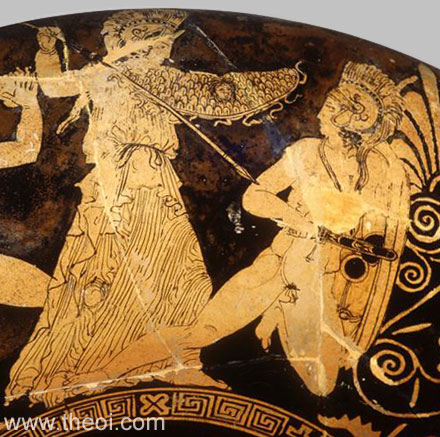
Pseudo-Apollodorus, Bibliotheca 1. 35 (trans. Aldrich) (Greek mythographer C2nd A.D.)
:
"There was an oracle among the gods that they themselves would not be able to destroy any of the Gigantes,
but would finish them off only with the help of some mortal ally . . . With Athena's help he [Zeus] called for
Herakles to be his ally. Herakles first sent an arrow at Alkyoneus, who by falling to the earth recovered
somewhat. Athena advised Herakles to drag him outside of Pallene, which he did, and Alkyoneus thereupon died. In
the course of the battle . . .
[During the battle of the gods and giants :] As Enkelados was fleeing, Athena threw the island of Sikelia
(Sicily) in his direction. She stripped off the skin of Pallas and used it to protect her own body during the
battle."
Pseudo-Apollodorus, Bibliotheca 2. 138 :
"When Herakles had destroyed Kos [the island kingdom], he found his way with Athena's help to Phlegra where
he helped the gods reduce the Gigantes."
Pausanias, Description of Greece 8. 47. 1 (trans. Jones) (Greek travelogue C2nd A.D.)
:
"[Athene] had the surname of Hippia (Horse). According to their account, when the battle of the gods and
Gigantes took place the goddess drove the chariot and horses against Enkelados."
Quintus Smyrnaeus, Fall of Troy 1. 235 ff (trans. Way) (Greek epic C4th A.D.)
:
"Like Tritonis [Athena] as she went to meet the Gigantes."
Quintus Smyrnaeus, Fall of Troy 14. 632 ff :
"As in the old time Pallas heaved on high Sikelia (Sicily), and on huge Enkelados dashed down the isle,
which burns with the burning yet of that immortal Gigante, as he breathes fire underground."
Pseudo-Hyginus, Astronomica 2. 3 (trans. Grant) (Roman mythographer C2nd A.D.)
:
"Some also say this [constellation Draco] dragon was thrown at Minerva [Athena] by the Giants, when she
fought them. Minerva, however, snatched its twisted form and threw it to the stars, and fixed it at the very
pole of heaven. And so to this day it appears with twisted body, as if recently transported to the stars."
Suidas s.v. Gigantiai (trans. Suda On Line) (Byzantine Greek lexicon C10th A.D.)
:
"[Titles of the gods :] Gigantoleteira, she who destroyed the Giants; also Gigantoletis, likewise
feminine."
Suidas s.v. Pallas :
"Pallas : A great virgin. It is an epithet of Athena; from brandishing (pallein) the spear, or
from having killed Pallas, one of the Gigantes."
For MORE information on the War of the Giants see GIGANTES
ATHENA & THE GIANT TYPHOEUS
Antoninus Liberalis, Metamorphoses 28 (trans. Celoria) (Greek mythographer C2nd A.D.)
:
"Typhon was the son of Ge (the Earth), a deity monstrous because of his strength, and of outlandish
appearance. There grew out of him numerous heads and hands and wings, while from his thighs came huge coils of
snakes. He emitted all kinds of roars and nothing could resist his might. Typhon felt an urge to usurp the rule
of Zeus and not one of the gods could withstand him as he attacked. In panic they fled to Aigyptos (Egypt), all
except Athena and Zeus, who alone were left. Typhon hunted after them, on their track. When they fled they had
changed themselves in anticipation into animal forms."
Valerius Flaccus, Argonautica 4. 235 ff (trans. Mozley) (Roman epic C1st A.D.)
:
"Typhoeus, boasting that already the kingdom of the sky and already the stars were won, felt aggrieved that
Bacchus [Dionysos] in the van [of a chariot] and Pallas, foremost of the gods, and a maiden's snakes [Athena's
aegis] confronted him."
For MORE information on this monstrous giant see TYPHOEUS
ATHENA & THE RAPE OF PERSEPHONE
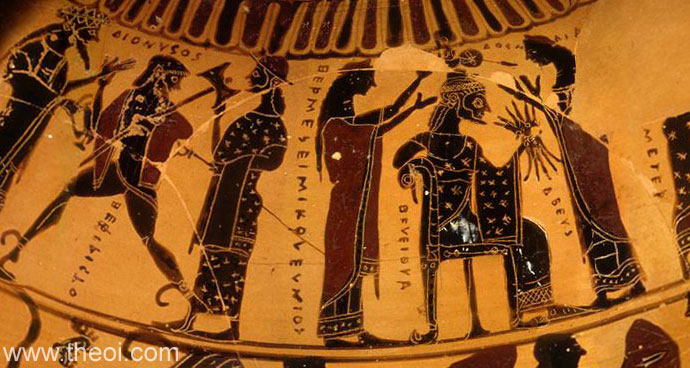
Homeric Hymn 2 to Demeter 415 ff (trans. Evelyn-White) (Greek epic C7th or 6th B.C.)
:
"[Persephone tells Demeter the tale of her abduction by Haides :] ‘All we were playing in a lovely
meadow, Leukippe and Phaino and Elektra and Ianthe [and other Okeanides] . . . with Pallas [Athena] who rouses
battles and Artemis Iokheaira (delighting-in-arrows) : we were playing and gathering sweet flowers in our hands,
soft crocuses mingled with irises and hyacinths, and rose-blooms and lilies, marvellous to see . . .’ [She
was then lured away from the company of the goddesses by a narcissus flower and seized by Haides.]"
Diodorus Siculus, Library of History 5. 2. 3 (trans. Oldfather) (Greek historian C1st
B.C.) :
"And both Athene and Artemis, the myth goes on to say, who had made the same choice of maidenhood as had
Kore [Persephone] and were reared together with her [on the island of Sicily], joined with her in gathering the
flowers, and all of them together wove the robe for their father Zeus. And because of the time they had spent
together and their intimacy they all loved this island above any other, and each one of them received for her
portion a territory, Athene receiving hers in the region of Himera . . . Artemis received from the gods the
island of Syrakouse."
Pausanias, Description of Greece 8. 31. 2 (trans. Jones) (Greek travelogue C2nd A.D.)
:
"Before them [statues of Demeter and Persephone in a temple in Megalopolis, Arkadia] he made small maids in
tunics reaching to the ankles, each of whom carries on her head a basket full of flowers. They are said to be
daughters of Damophon, but those inclining to a more religious interpretation hold that they are Athena and
Artemis gathering the flowers with Persephone."
Pseudo-Hyginus, Fabulae 146 (trans. Grant) (Roman mythographer C2nd A.D.)
:
"[Zeus] bade him [Haides] seize her [Persephone] as she was gathering flowers on Mount Etna, which is in
Sicily. While Proserpina was gathering flowers with Venus [Aphrodite], Diana [Artemis], and Minerva [Athena],
Pluto [Haides] came in his four-horse chariot, and seized her."
Valerius Flaccus, Argonautica 5. 344 ff (trans. Mozley) (Roman epic C1st A.D.)
:
"Proserpine [Persephone] in spring-time led the dance over Hymettus' flowery ridges or beneath the cliffs
of Sicily, on this side stepping close by Pallas [Athene], on that side hand in hand with her beloved Diana
[Artemis], taller than they and surpassing her fellows, ere, she grew pale at the sight of Avernus [Haides] and
all her beauty fled."
Statius, Achilleid 1. 824 ff (trans. Mozley) (Roman epic C1st A.D.) :
"Beneath the rocks of Aetna in Sicily Diana [Artemis] and bold Pallas [Athene] and the consort of the
Elysian monarch [Persephone] shine forth among the Nymphae of Enna."
For MORE information on the abduction see RAPE OF PERSEPHONE
ATHENA & THE CREATION OF PANDORA
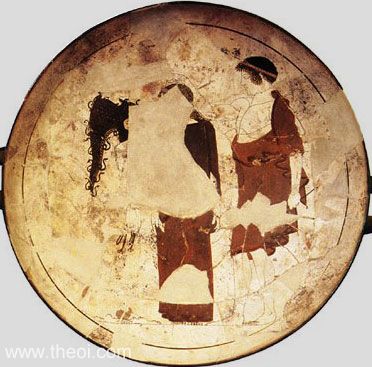
Hesiod, Theogony 561 ff (trans. Evelyn-White) (Greek epic C8th or 7th B.C.)
:
"He [Zeus] made an evil thing for men as the price of fire; for the very famous Limping God [Hephaistos]
formed of earth the likeness of a shy maiden [i.e. Pandora, the first woman,] as the son of Kronos [Zeus]
willed. And the goddess bright-eyed Athene girded and clothed her with silvery raiment, and down from her head
she spread with her hands a broidered veil, a wonder to see; and she, Pallas Athene, put about her head lovely
garlands, flowers of new-grown herbs. Also she put upon her head a crown of gold which the very famous Limping
God [Hephaistos] made himself and worked with his own hands as a favour to Zeus his father . . . But when he had
made the beautiful evil to be the price for the blessing, he brought her out, delighting in the finery which the
bright-eyed daughter [Athena] of a mighty father had given her, to the place where the other gods and men were.
And wonder took hold of the deathless gods and mortal men when they saw that which was sheer guile, not to be
withstood by men."
Hesiod, Works and Days 60 ff (trans. Evelyn-White) (Greek epic C8th or 7th B.C.)
:
"[Zeus] bade famous Hephaistos make haste and mix earth with water and to put in it the voice and strength
of human kind, and fashion a sweet, lovely maiden-shape [i.e. the very first woman, Pandora], like to the
immortal goddesses in face; and Athene to teach her needlework and the weaving of the varied web; and golden
Aphrodite to shed grace upon her head and cruel longing and cares that weary the limbs. And he charged Hermes
the guide, Argeiphontes, to put in her a shameless mind and a deceitful nature.
So he ordered. And they obeyed the lord Zeus the son of Kronos. Forthwith the famous Lame God moulded clay in
the likeness of a modest maid, as the son of Kronos purposed. And the goddess bright-eyed Athene girded and
clothed her, and the divine Kharites (Graces) and queenly Peitho (Persuasion) put necklaces of gold upon her,
and the rich-haired Horai (Hours) crowned her head with spring flowers. And Pallas Athene bedecked her form with
all manners of finery . . . And he called this woman Pandora (All-Gifts), because all they who dwelt on Olympos
gave each a gift, a plague to men who eat bread."
Pseudo-Hyginus, Fabulae 142 (trans. Grant) (Roman mythographer C2nd A.D.)
:
"Prometheus, son of Iapetus, first fashioned men from clay. Later Vulcan [Hephaistos], at Jove's [Zeus']
command, made a woman's form from clay. Minerva [Athene] gave it life, and the rest of the gods each gave come
other gift. Because of this they named her Pandora. She was given in marriage to Prometheus' brother Epimetheus.
Pyrrha (Fire) was her daughter, and was said to be the first mortal born."
ATHENA & POSEIDON VIE FOR TROEZEN
Pausanias, Description of Greece 2. 30. 6 (trans. Jones) (Greek travelogue C2nd A.D.)
:
"During his [Althepos'] reign, they say, Athena and Poseidon disputed about the land [of Troizenos in the
Argolis], and after disputing held it in common, as Zeus commanded them to do. For this reason they worship both
Athena . . . also Poseidon . . . Moreover their old coins have as device a trident and a face of Athena."
ATHENA & POSEIDON VIE FOR ATHENS
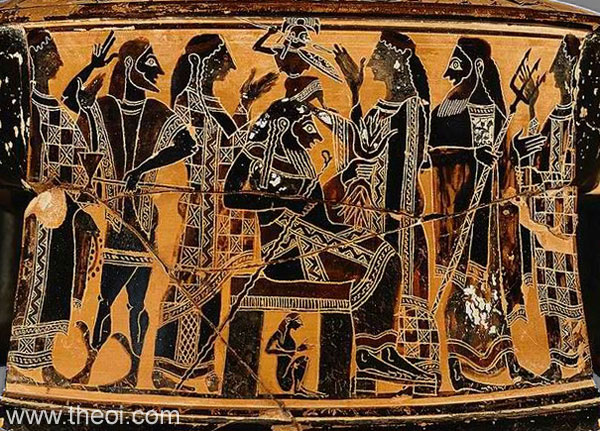
Plato, Menexenus 237c (trans. Fowler) (Greek philosopher C4th B.C.) :
"Our country [Athens] is deserving of praise, not only from us but from all men, on many grounds, but first
and foremost because she is god-beloved. The strife of the gods who contended over her [i.e. Athena and
Poseidon] and their judgement testify to the truth of our statement."
Pseudo-Apollodorus, Bibliotheca 3. 14. 1 (trans. Frazer) (Greek mythographer C2nd
A.D.) :
"Kekrops, a son of the soil, with a body compounded of man and serpent, was the first king of Attika . . .
In his time, they say, the gods resolved to take possession of cities in which each of them should receive his
own peculiar worship. So Poseidon was the first that came to Attika, and with a blow of his trident on the
middle of the acropolis, he produced a sea which they now call Erekhtheis. After him came Athena, and, having
called on Kekrops to witness her act of taking possession, she planted an olive tree, which is still shown in
the Pandrosion. But when the two strove for possession of the country, Zeus parted them and appointed arbiters,
not, as some have affirmed, Kekrops and Kranaus, nor yet Erysikhthon, but the twelve gods
(dodekatheoi). And in accordance with their verdict the country was adjudged to Athena, because Kekrops
bore witness that she had been the first to plant the olive. Athena, therefore, called the city Athens after
herself, and Poseidon in hot anger flooded the Thriasian plain and laid Attika under the sea."
Callimachus, Hecale Fragment 1. 2 (from Papyri) (trans. Trypanis) (Greek poet C3rd
B.C.) :
"The land [Attika] which she [Athena] had newly obtained by vote of Zeus and the twelve other immortals and
the witness of the Snake [Kekrops]."
Pausanias, Description of Greece 1. 24. 2 (trans. Jones) (Greek travelogue C2nd A.D.)
:
"[On the Akropolis is a] group [of statues] dedicated by Alkamenes. Athena is represented displaying the
olive plant, and Poseidon the wave."
Pausanias, Description of Greece 1. 24. 5 :
"As you enter the temple [of Athena on the Akropolis at Athens] that they name the Parthenon, all the
sculptures you see on what is called . . . the rear pediment represent the contest for the land between Athena
and Poseidon."
Pausanias, Description of Greece 1. 27. 1 :
"[Near the temple of Athena Polias on the Akropolis of Athens:] About the olive tree they have nothing to
say except that it was testimony the goddess produced when she contended for their land. Legend also says that
when the Persians fired Athens the olive was burnt down, but on the very day it was burnt it grew again to the
height of two cubits."
Pseudo-Hyginus, Fabulae 164 (trans. Grant) (Roman mythographer C2nd A.D.)
:
"When there was a contest between Neptunus [Poseidon] and Minerva [Athena] as to who should be the first to
found a town in the Attic land, they took Jove [Zeus] as judge. Minerva [Athena] won because she first planted
the olive in that land, said to be there to this day. But Neptunus [Poseidon], in anger, wanted to have the sea
flood that land. Mercurius [Hermes], at Jove's [Zeus'] command, forbade his doing that. And so Minerva [Athena]
in her own name founded Athens, a town said to be the first established in the world."
Ovid, Metamorphoses 6. 70 ff (trans. Melville) (Roman epic C1st B.C. to C1st A.D.)
:
"The rock of Mavors [Ares] in Cecrops' citadel is Pallas' [Athena's] picture [in her weaving contest with
Arakhne] and that old dispute about he name of Athens. Twelve great gods, Jove [Zeus] in their midst, sit there
on lofty thrones, grave and august, each pictured with his own familiar features: Jove [Zeus] in regal grace,
the Sea-God [Poseidon] standing, striking the rough rock with his tall trident, and the wounded rock gushing
sea-brine, his proof to clinch his claim. Herself she gives a shield, she gives a spear sharp-tipped, she gives
a helmet for her head; the aegis guards her breast, and from the earth struck by her spear, she shows an olive
tree, springing pale-green with berries on the boughs; the gods admire; and Victoria [Nike] ends the work."
For MORE information on this god see POSEIDON
ATHENA & THE LAYING OF THE ACROPOLIS
Callimachus, Hecale Fragment 1. 2 (from Papyri) (trans. Trypanis) (Greek poet C3rd
B.C.) :
"Pallas laid him [the infant Erikhthonios] . . . within the chest, until she set a rock [the Akropolis] in
Akte (Attika) for the sons of Kekrops . . . Then she [Athena], that she might lay a bulwark [the Akropolis] for
the land which she had newly obtained by vote of Zeus and the twelve other immortals and the witness of the
Snake [Kekrops], came unto Pellene in Akhaia."
ATHENA & THE BIRTH OF ERICHTHONIUS
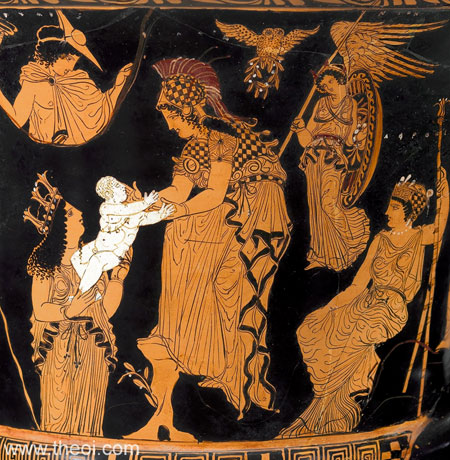
Pseudo-Apollodorus, Bibliotheca 3. 14. 6 (trans. Frazer) (Greek mythographer C2nd
A.D.) :
"Some say that this Erikhthonios was a son of Hephaistos and Atthis, daughter of Kranaus, and some that he
was a son of Hephaistos and Athena, as follows: Athena came to Hephaistos, desirous of fashioning arms. But he,
being forsaken by Aphrodite, fell in love with Athena, and began to pursue her; but she fled. When he got near
her with much ado (for he was lame), he attempted to embrace her; but she, being a chaste virgin, would not
submit to him, and he dropped his seed on the leg of the goddess. In disgust, she wiped off the seed with wool
and threw it on the ground; and as she fled and the seed fell on the ground, Erikhthonios was produced. Him
Athena brought up unknown to the other gods, wishing to make him immortal; and having put him in a chest, she
committed it to Pandrosos, daughter of Kekrops, forbidding her to open the chest. But the sisters of Pandrosos
opened it out of curiosity, and beheld a serpent coiled about the babe; and, as some say, they were destroyed by
the serpent, but according to others they were driven mad by reason of the anger of Athena and threw themselves
down from the acropolis. Having been brought up by Athena herself in the precinct, Erikhthonios expelled
Amphiktyon and became king of Athens; and he set up the wooden image of Athena in the acropolis, and instituted
the festival of the Panathenaia."
Callimachus, Hecale Fragment 1. 2 (from Papyri) (trans. Trypanis) (Greek poet C3rd
B.C.) :
"Pallas laid him [Erikhthonios], the ancient seed of Hephaistos within the chest, until she set a rock in
Akte (Attika) for the sons of Kekrops; a birth mysterious and secret, whose lineage I neither knew nor learnt,
but they themselves [the daughters of Kekrops] declared, according to report among the primeval birds, that Gaia
(earth) bare him to Hephaistos."
Pausanias, Description of Greece 1. 14. 6 (trans. Jones) (Greek travelogue C2nd A.D.)
:
"[In Athens] is a temple of Hephaistos [the Erikhthonion]. I was not surprised that by it stands a statue
of Athena, because I knew the story about Erikhthonios."
Pausanias, Description of Greece 3. 18. 13 :
"[Amongst the scenes represented on the throne of Apollon at Amyklai near Sparta:] Athena is running away
from Hephaistos, who chases her."
Philostratus, Life of Apollonius of Tyana 7. 24 (trans. Conybeare) (Greek biography
C1st to 2nd A.D.) :
"[A man] omitted to mention in the public prayers that [the Roman Emperor] Domitian was the son of Athene.
Said Apollonios : ‘You imagined that Athene could not possibly have a son, because she is a virgin, for
ever and ever; but you forgot, methinks, that this goddess one on a time bore a Drakon [Erikhthonios] to the
Athenians.’"
Pseudo-Hyginus, Fabulae 166 (trans. Grant) (Roman mythographer C2nd A.D.)
:
"When Vulcanus [Hephaistos] had made golden [thrones or sandals] for Jove [Zeus] and for the other gods, he
made one of adamant [for Juno or Hera], and as soon as she sat down she suddenly found herself hanging in the
air. When Vulcanus [Hephaistos] was summoned to free his mother whom he had bound, in anger because he had been
thrown from Heaven, he denied that he had a mother. When Father Liber [Dionysos] had brought him back drunk to
the council of the gods, he could not refuse this filial duty. Then he obtained freedom of choice from Jove
[Zeus], to gain whatever he sought from them. Therefore Neptunus [Poseidon], because he was hostile to Minerva
[Athena], urged Vulcanus [Hephaistos] to ask for Minerva [Athena] in marriage. This was granted, but Minerva
[Athena], when he entered her chamber, defended her virginity with arms. As they struggled, some of his seed
fell to earth, and from it a boy was born, the lower part of whose body was snake-formed. They named him
Erichthonius, because eris in Greek means ‘strife’, and khthon means
‘earth’. When Minerva [Athena] was secretly caring for him, she gave him in a chest to Aglaurus,
Pandrosus, and Herse, daughters of Cecrops, to guard. A crow gave the secrete away when the girls opened the
chest, and they, driven made by Minerva [Athena], threw themselves into the sea."
Pseudo-Hyginus, Astronomica 2. 13 :
"Euripides [Greek tragedian C5th B.C.] gives the following account of his [Erikhthonios'] birth. Volcanus
[Hephaistos], inflamed by Minerva's [Athene's] beauty, begged her to marry him, but was refused. She hid herself
in the place called Hephaestius [sanctuary in Athens?], on account of the love of Volcanus. They say that
Volcanus [Hephaistos], following her there, tried to force her, and when, full of passion he tried to embrace
her, he was repulsed, and some of his seed fell to the ground. Minverva [Athene], overcome by shame, with her
foot spread dust over it. From this the snake Erichthonius was born, who derives his name from the earth and
their struggle."
Ovid, Metamorphoses 2. 550 ff (trans. Melville) (Roman epic C1st B.C. to C1st A.D.)
:
"Once upon a time a baby, Erichthonius, was born without a mother. Pallas [Athena] hid the child safe in a
box of wicker wood and gave the box to Cecrops' three unmarried daughters, with strict instructions not to pry
inside."
Ovid, Metamorphoses 2. 748 ff :
"Fair-haired Minerva's [Athena's] mystery . . . the infant boy [Erikhthonios], great Lemnicola's
[Hephaistos'] child, the babe no mother bore."
Cicero, De Natura Deorum 3. 22 (trans. Rackham) (Roman rhetorician C1st B.C.)
:
"Volcanos [Hephaistos] . . . was reputedly the father by Minerva [Athene] of the Apollo [Erikhthonios] said
by the ancient historians to be the tutelary deity of Athens."
For the REST of this story see Athena Wrath: Cecropides & the Crow
ATHENA, MARSYAS & THE FLUTE
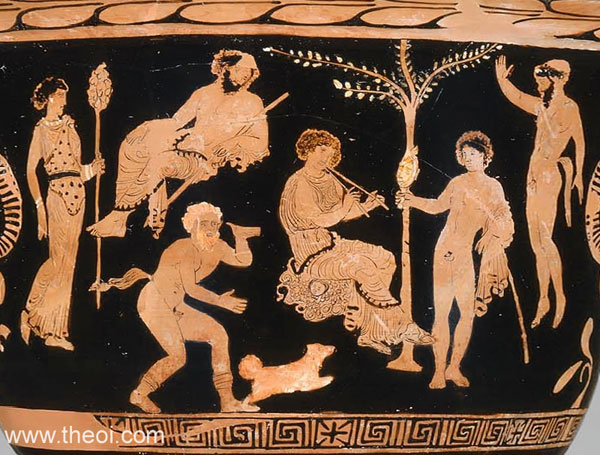
Pindar, Pythian Ode 12. 7 ff (trans. Conway) (Greek lyric C5th B.C.) :
"The art that long ago Pallas Athene invented [the flute], weaving in music's rich refrain the ghoulish
dirge of the fierce-hearted Gorgones. This in their anguished struggle from those dread maiden's lips was heard
streaming, and from those writhing serpent heads untouchable, when Perseus o'er the third of those fell sisters
[i.e. Medousa] launched his cry of triumph . . . that son of Danae, who reaped the head of fair-cheeked Medousa
. . . But when the goddess maid delivered from these labours the man she loved, then she contrived the manifold
melodies of the flute, to make in music's notes an image of the shrill lamenting cries, strung from Euryale's
ravening jaws. A goddess found, but finding, gave the strain to mortal men to hold, naming it the tune of many
heads."
Telestes, Fragment 805 (from Athenaeus, Scholars at Dinner) (trans. Campbell, Vol.
Greek Lyric V) (B.C.) :
"I do not believe in my heart that the clever one, divine Athena took the clever instrument in the mountain
thickets and then in fear of eye-offending ugliness threw it from her hands to be the glory of the Nymphe-born,
hand-clapping beast Marsyas; for why should a keen yearning for lovely beauty distress her, to whom Klotho had
assigned a marriageless and childless virginity."
Pseudo-Apollodorus, Bibliotheca 1. 24 (trans. Aldrich) (Greek mythographer C2nd A.D.)
:
"[Marsyas] had come upon the flute which Athena had thrown away because it made her face misshapen, and he
proceeded to face Apollon in a musical contest."
Pausanias, Description of Greece 1. 24. 1 (trans. Jones) (Greek travelogue C2nd A.D.)
:
"In this place [on the Akropolis, Athens] is a statue of Athena striking Marsyas the Seilen for taking up
the flutes that the goddess wished to be cast away for good."
Plutarch, Life of Alcibiades 2. 5 (trans. Perrin) (Greek historian C1st to C2nd A.D.)
:
"[On flute-playing :] Athena for foundress and Apollon for patron, one of whom cast the flute away in
disgust, and the other flayed the presumptuous flute-player [Marsyas]."
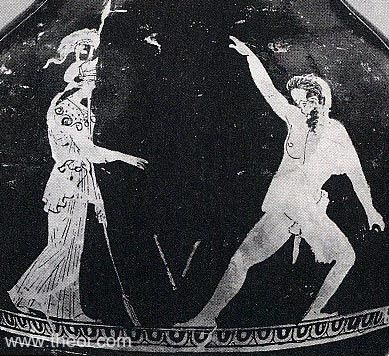
Pseudo-Hyginus, Fabulae 165 (trans. Grant) (Roman mythographer C2nd A.D.)
:
"Minerva [Athena] is said to have been the first to make pipes from deer bones and to have come to the
banquet of the gods to play. Juno [Hera] and Venus [Aphrodite] made fun of her because she was grey-eyed and
puffed out her cheeks, so when mocked in her playing and called ugly she came to the forest of Ida to a spring,
as she played she viewed herself in the water, and saw that she was rightly mocked. Because of this she threw
away the pipes and vowed that whoever picked them up would be punished severely. Marsyas, a shepherd, son of
Oeagrus, one of the satyrs, found them, and by practicing assiduously kept making sweeter sounds day by day, so
that he challenged Apollo to play the lure in a contest with him."
Ovid, Metamorphoses 6. 382 ff (trans. Melville) (Roman epic C1st B.C. to C1st A.D.)
:
"The Satyr [Marsyas] lost to Latous [Apollon] the contest when he played Tritonia's [Athene's] pipe."
Ovid, Fasti 6. 697 ff (trans.Boyle) (Roman poetry C1st B.C. to C1st A.D.)
:
"[Minerva-Athena tells the tale of her invention of the flute :] ‘I first enabled the long flute to
produce notes through spaced holes in perforated boxwood. The sound pleased; but the limpid waters reflected my
face, and I glimpsed puffed virgin cheeks. "Art is not worth this to me; farewell, my flute," I said.
The bank receives my cast-off on its turf. A Satyrus [Marsyas] finds it and marvels at first, ignorant of its
use. He learns that breath creates sound; and, fingering the pipe, he blows and draws in air. And now boasted of
his art to the Nymphae. He challenges Phoebus [Apollon], too. Phoebus won, he hung. His flayed limbs separated
from their skin.’"
Statius, Silvae 5. 3. 87 ff (trans. Mozley) (Roman poetry C1st A.D.) :
"He [Marsyas] who dared make music against Phoebus [Apollon], while Pallas [Athene] rejoiced that the
boxwood-pipe deceived him."
Nonnus, Dionysiaca 10. 232 ff (trans. Rouse) (Greek epic C5th A.D.) :
"The Mygdonian flutist [Marsyas] whom divine Hyagnis begat, who to his cost challenged Phoibos as he
pressed the fingerholes on Athene's double pipe."
Nonnus, Dionysiaca 24. 35 ff :
"My reeds, which . . . your musical Athena may reproach you one day: she who invented the Libyan double
pipes to imitate with their tootle the voices of the Gorgones' grim heads."
Nonnus, Dionysiaca 40. 227 ff :
"The double Berekyntian pipes in the mouth of Kleokhos droned a gruesome Libyan lament, one which long ago
both [the Gorgones] Sthenno and Euryale with one many-throated voice sounded hissing and weeping over Medousa
newly gashed, while their snakes gave out voice from two hundred heads, and from the lamentations of their
curling and hissing hairs they uttered the ‘manyheaded dirge of Medousa.’"
For RELATED myths see Athena Wrath: Medusa
For MORE information on the satyr see MARSYAS
SOURCES
GREEK
- Hesiod, Theogony - Greek Epic C8th - 7th B.C.
- Hesiod, Works and Days - Greek Epic C8th - 7th B.C.
- The Homeric Hymns - Greek Epic C8th - 4th B.C.
- Pindar, Odes - Greek Lyric C5th B.C.
- Greek Lyric V Telestes, Fragments - Greek Lyric C5th B.C.
- Plato, Menexenus - Greek Philosophy C4th B.C.
- Apollodorus, The Library - Greek Mythography C2nd A.D.
- Callimachus, Fragments - Greek Poetry C3rd B.C.
- Strabo, Geography - Greek Geography C1st B.C. - C1st A.D.
- Pausanias, Description of Greece - Greek Travelogue C2nd A.D.
- Plutarch, Lives - Greek Historian C1st - 2nd A.D.
- Antoninus Liberalis, Metamorphoses - Greek Mythography C2nd A.D.
- Philostratus the Elder, Imagines - Greek Rhetoric C3rd A.D.
- Philostratus, Life of Apollonius of Tyana - Greek Biography C2nd A.D.
- Quintus Smyrnaeus, Fall of Troy - Greek Epic C4th A.D.
- Nonnus, Dionysiaca - Greek Epic C5th A.D.
ROMAN
- Hyginus, Fabulae - Latin Mythography C2nd A.D.
- Hyginus, Astronomica - Latin Mythography C2nd A.D.
- Ovid, Metamorphoses - Latin Epic C1st B.C. - C1st A.D.
- Ovid, Fasti - Latin Poetry C1st B.C. - C1st A.D.
- Valerius Flaccus, The Argonautica - Latin Epic C1st A.D.
- Statius, Achilleid - Latin Epic C1st A.D.
- Statius, Silvae - Latin Poetry C1st A.D.
BYZANTINE
- Suidas, The Suda - Byzantine Greek Lexicon C10th A.D.
BIBLIOGRAPHY
A complete bibliography of the translations quoted on this page.